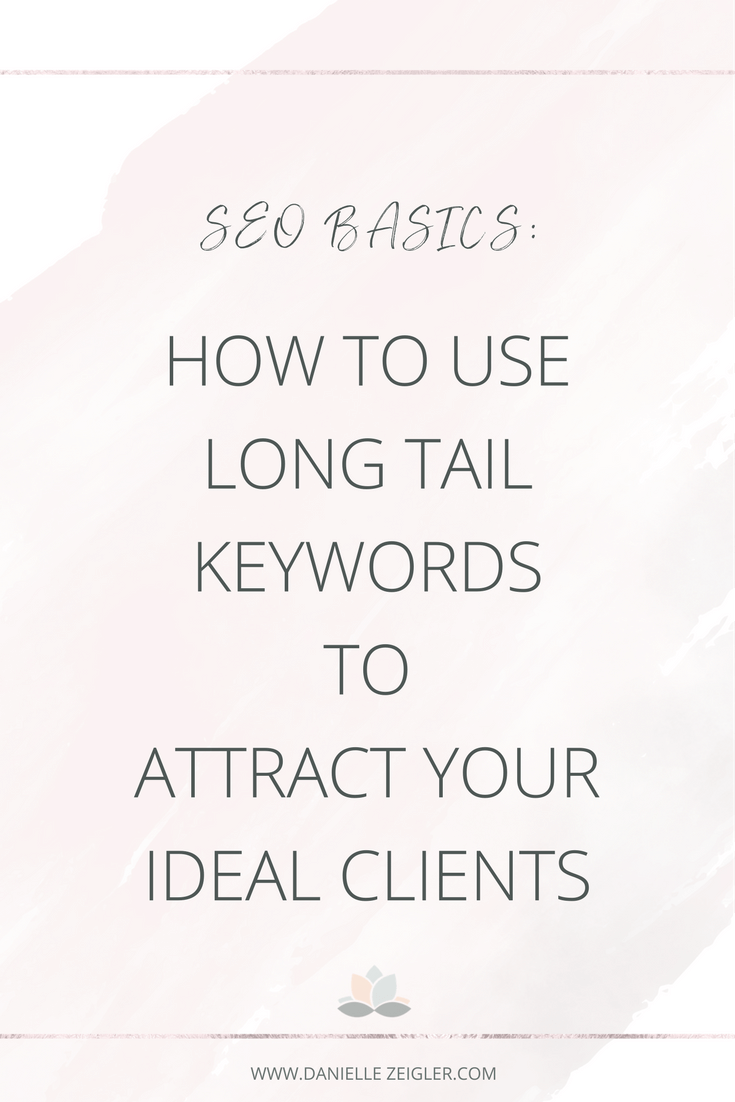SEO Basics: How to Use Long Tail Keywords to Attract Your Ideal Clients
/I know what you may be thinking, "First there are keywords, now long tail keywords?! There's just too much to learn for SEO." At least, that's an exact response I got from a client. So chances are, plenty of others feel the same!
But don't be intimidated by all the different SEO phrases you hear.
Once it's broken down and you understand the purpose, it'll all come much more naturally.
When you first get an idea for anything from a new business down to a new blog post, doing a bit of keyword research can go a long way.
Keyword research can help you learn how to better phrase your topic, questions your audience has around the topic, the general popularity of a keyword phrase, and much more.
Long tail keywords are researched in the same way, but help you dig deeper and reach a more specific audience (*ehm* more qualified leads).
People are already searching for your solutions, so why not meet them halfway and help them find you in the search results?
When doing your research, keep in mind that there's a difference between targeting vague and specific terms. This is where "long term keywords" come in.
Let's say you're a wellness coach helping women. Researching “wellness” vs. “wellness coach” vs. “wellness coach for women” could show misleading results.
Sure, "wellness" will have more monthly average searches, but those people could be searching for millions of different reasons. It could be a man searching for a new doctor, a child doing research for health class, or any number of other searches that aren't in your target audience.
However, someone searching "wellness coach for women" is much more likely to be a highly qualified lead.
It'll be a smaller percentage of people who know that's what they want and need, but those who DO are so much closer to the buying stage.
So let's break down what long tail keywords mean and how you can optimize your website and blog posts for them.
What are long tail keywords?
Keywords are the words or phrases that describe your site, landing page or blog post. They're what people type into a search engine.
You can optimize your site and posts for certain phrases to help those searchers find your content more easily.
Long tail keywords are keyword phrases that are more detailed (and therefore longer... it's really quite simple!).
For example, a specific question or phrase, such as "Best Men's Shoes for Running Marathons" is considered a long tail keyword.
You can see the breakdown of the phrase getting more specific below:
More Examples of Long Tail Keywords
When I head over to Google, I usually have a question in mind or need a specific piece of information.
Whenever I last moved, I needed help making it more efficient.
Instead of Googling "moving tips" or "DMV," you can see I typed in exactly what I was looking for:
The items highlighted in purple are the searches I had made. You can see they're longer and more detailed.
That first link to DMV.org is exactly what I needed. And you see how the title tag matches my search closely? That title tag helped Google know what the page is about and also helped me know it's exactly what I'm looking for.
Why are long tail keywords important?
People tend to search with longer, more detailed phrases these days.
Think back to my example of "wellness" vs. "wellness coach for women." Which are YOU more likely to search for?
Plus, by searching with longer queries, searchers are more likely to find the topic and answer they're looking for, leading to higher engagement with that website. So it's a very good thing to be the website providing that answer.
Quality > Quantity: you may not get as many clicks, but visitors are more likely to be qualified leads, meaning they are actually interested in what you're offering and closer to making a purchase.
According to Forbes, 80-90% of shoppers check online reviews before making a purchase.
Another benefit to long tail keywords is that the more specific your phrase, the less competition there will be for Google rankings.
3 Ways to use long tail keywords on your blog to attract new clients
1 | Keep a document with frequently asked questions from your current clients or followers.
2 | Turn these questions into blog posts, using the question (or something similar) as the title.
3 | Having the question, aka long-tail keyword phrase, in the blog post title, title tag + H1 tag will help in your search engine listing. "How to" and "best way to" posts are great because people are often searching for tutorials
Want to expedite your blog rankings and traffic? Join my FREE 6-day SEO Made Simple Challenge…














